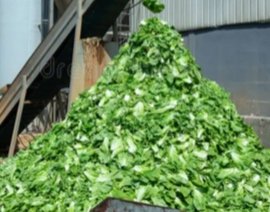Are We Missing the Real Opportunity? A Processor’s View: Food Waste and Cost Savings
We recently had an enlightening conversation with a major processor in the salad industry. Discussing the ongoing advancements in agricultural technology, particularly new technology in soil analytics and yield data in crop yield estimation.
These tools are often celebrated as the key to the future of farming, offering new ways to optimize our operations and boost productivity.
Reducing this waste is essential to achieving the full potential of modern agricultural practices and enhancing overall profitability
The processor pointed out an aspect that piqued our interest: “What’s the overall effectiveness value of high-tech solutions if we’re still wasting 25-30% of our produce at the de-coring stage?”
The Current Focus: Soil Analytics and Yield Statistics
No one can argue that soil analytics and yield statistics are game changers. They allow us to make data-driven decisions that enhance the way we farm, the more data that can be gathered will result in better use of resources and higher yields. But according to this particular processor, the industry might be getting a bit too caught up in the hype.
The Real Issue: Post-Harvest Waste at the De-Coring Stage
The processor highlighted a critical issue that’s not getting nearly enough attention: the massive waste that happens during the post-harvest stage of salad processing. As much as 25-30% of the lettuce is still being discarded in hand cut processing at the de-coring stage, perfectly good produce that never makes it to the consumer.
This waste doesn’t just hurt the bottom line; it also negates much of the progress made with the high-tech tools which focus solely on ‘field’ aspect of crop production.
There is a shortfall of analytics in the post harvest sector, many processors deem the loss at this processing stage to be the norm - an unavoidable factor. When in fact huge savings can be made in this area.
Why It Matters: The True Cost of Ignoring Waste
If such a significant portion of crops are lost during processing, are we really maximizing the potential of our innovations? No matter how much we improve field statistics - if processing waste is not addressed, investments cannot be fully capitalised.
By continuing to lose 25-30% of produce through the process chain, particularly at the de-coring stage, and accepting this as the norm - the benefits of advanced soil analytics and yield statistics become less impactful by default. This significant waste undermines the efficiency gains promised by high-tech farming innovations.
The true cost isn’t just in lost produce; it’s in wasted resources, missed revenue, and diminished sustainability. By not addressing this issue, we’re failing to fully capitalize on our investments and undermining efforts to optimize the agricultural supply chain. Reducing this waste is essential to achieving the full potential of modern agricultural practices and enhancing overall profitability.
“What’s the overall effectiveness value of high-tech solutions if we’re still wasting 25-30% of our produce at the de-coring stage?”
A New Focus: Reducing Waste for True Efficiency
The processor emphasized (and we agree) that the real opportunity for cost savings and sustainability lies in reducing post-harvest waste. “By investing in better de-coring technologies, we can cut the 25-30% waste that occurs in our post- harvest processing and this approach not only preserves more of what we grow, but also significantly boosts profitability.”
The focus on advanced soil analytics and yield statistics is important, but if we continue to lose a substantial portion of the crop during processing, we’re missing the real opportunity. Reducing waste at the de-coring stage is crucial for maximizing both sustainability and financial returns.
Moving Forward
It’s time to broaden the focus.
While high tech data gathering is very important, that’s just one piece of the puzzle. To truly maximize efficiency and sustainability, we must analyze the entire supply chain, especially the stages where significant produce is merely wasted!
Post-harvest processes like de-coring are the critical points where high percentages of valuable crops can be discarded through mis-handling.
By addressing these losses, we can enhance overall productivity and reduce waste, making operations more sustainable.
It’s not just about growing more - it’s about preserving, and making the most of what we already have.
We’d love to hear your thoughts - Please share your perspective with us here.




